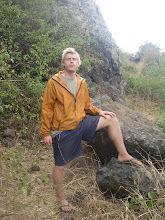summer vacation

After much deliberation, I decided it would be best to come home. I had hoped to stay in Cape Verde and be the hardcore white lightning that would save Africa. Then near the end of my service, I realized I wasn't yet prepared to do that.
I started a company, prior to my decision to return home, that would both import renewable energy system technologies - mainly solar panels, solar street lights and small scale wind turbines - and educate Capeverdeans how to assess potential sites, install and maintain these new technologies. The overall goal of the company would be to help the country achieve it's goal of having 50% of the country's energy come from renewable sources. The company is called Desol, Limited. Once I registered the company, I sweated through my button down shirt day after day in sticky hot Praia trying to schmooze with influential people and figure out where to start. One day, I weaseled my way into a one-on-one meeting with the Minister of Energy and Industry. He listened to my business plan. He said he liked the business plan. He then told me to give him a price for how much it would cost to get Chã das Caldeiras, a zone in the middle of a volcano on the island of Fogo, converted to 100% renewable energy. I said, "Awesome. I'll get back to you shortly." 15 minutes later, I realized I didn't actually know how to do that. Plus I had no money.
Three days later I found myself browsing the internet looking for renewable energy courses. I found the Northwest Renewable Energy Institute, www.nw-rei.com. It is located outside Portland, Oregon and opened this past May. I applied and got in. Classes run October to April and focus on electricity, mechanics, hydraulics and rigging - all the meat of machines, electricity and engines... the important stuff I don't know about. If I pass the class, I will become a certified windsmith (a wind turbine technician, the person who installs the 200' tall wind turbines). pretty cool stuff. soooo... back to school for this guy.
The business strategy I proposed can be found here. Please contact me (bri.newhouse@gmail.com) if you have comments on the plan. While I'm in school this fall and spring, I hope to explore this strategy a bit more to see if it would actually work. Then later on when the time is right, I hope to meet with Mr Lopes again and make headway on his offer.
So anyway, back to Peace Corps. During my service I trained 140 high school students to design and draft a local government approved 1:100 scale house plan. The course is posted online here. You know, there is nothing like overseeing a classroom of students, quietly working on something they enjoy doing. I always thought this quietness was the sound of learning. Education can be a wonderfully powerful tool. Also, not related to education, if you want to get into some small scale renewable projects, check out the people to water cycle wiki page. It is some projects my colleagues and I were working on, plus some additional projects we found online to complete the cycle so to speak.
Final thoughts on Peace Corps? I think Peace Corps is a profoundly interesting and important organization. As a Volunteer, I learned a lot about the essence of communities and what people really need to live. Peace Corps takes people who have had, and capitalized on, those things we take for granted - like schools, jobs and good health - then sends them to live among people who haven't had all of those opportunities. I think cultural understanding is recognizing the commonalities among people, sympathizing with them and working with them to create incentives using their available resources.
Another cultural understanding I learned is making an effort to take life at a more relaxed pace. For example, often times plans I arranged with Capeverdean friends or colleagues would fall apart. Sometimes I would stress out about it. Rarely would a Capeverdean stress out about it. I think the ultimate objective of the Peace Corps experience is, in these circumstances, to have both people meet halfway... where the American learns the value of not stressing out over everything and the Capeverdean learns the value of following through on new ideas.
As an institution, Peace Corps needs to be more open to change. When my colleagues and I tried to introduce reasonable program improvements to our administration, we were met with great resistance. I think this is foolish. There are a multitude of great ideas out there that can be implemented at minimal cost. But get these ideas moving in the current organizational structure will require the open ears of Washington bureaucrats.
Another problem is the large disparity between volunteers and the administration - Peace Corps admin seems to regard volunteers as liabilities rather than assets. If the contribution of volunteers was respected a bit more in general programming, the organization could have huge impact on developing countries. HUGE. But right now, this isn't the case. It's too bad because the losers in this situation are not the volunteers or the administration, it's the citizens of the 89 host countries. How can Peace Corps become a more serious development organization? Not a day goes by I don't ask myself that same question.
Thanks for reading.
Brian




2 comments:
Good last post and good last thoughts. Good luck at school, let me know how it goes!
Daron
Brian, you're the best man. Good luck with everything out in the NW. I know you'll make the best of it. We'll be in touch.
Post a Comment